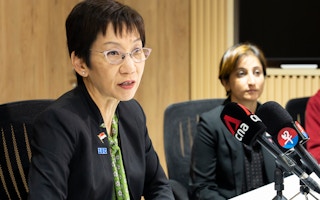Simply doling out grants for climate efforts may not ensure the best outcomes, according to a senior Singapore official.
To continue reading, subscribe to Eco‑Business.
There's something for everyone. We offer a range of subscription plans.
- Access our stories and receive our Insights Weekly newsletter with the free EB Member plan.
- Unlock unlimited access to our content and archive with EB Circle.
- Publish your content with EB Premium.
Instead, Singapore prefers to help by using seed money to mobilise more capital, and setting technical standards for climate initiatives, the country’s sustainability and the environment minister Grace Fu said on the sidelines of the United Nations COP27 climate summit in Egypt.
“Those [actions] will be more impactful than being a donor country and putting [money] into a fund that we may not have the necessary line-of-sight to,” Fu said, at a press conference for Singapore journalists.
Fu was responding to an Eco-Business question on whether Singapore is ready to adopt a developed country status on global climate matters, and take on greater responsibilities in providing climate finance.
Singapore is classified under the United Nations as a developing country, even though its per-capita gross domestic product is one of the highest globally. Under the landmark Paris Agreement climate treaty in 2015, developing countries are generally less obliged than their developed counterparts to mobilise climate finance – based in part on their lower contributions to historical emissions.
Climate finance is one of the most contentious topics at COP27, with poorer states asking for more money to not only protect themselves against climate change, but also for recovering from climate disasters and doing their part at stemming global warming.
For its part, Singapore has committed climate funds outside of the United Nations process. The city-state contributes to a flood insurance programme for Laos, and intends to offer similar services to other Southeast Asia countries.
Singapore’s central bank last month pledged seed capital into a US$3.7 million ‘Asia Climate Solutions Design Grant’, meant to help develop blended finance mechanisms for sustainability projects in Asia.
“We are not a nation that is contributing to finance, [but] we can still do our part to activate private sector finance, and from the community,” Fu said, pointing to cooperation deals signed with Papua New Guinea and Ghana on developing carbon markets at COP27. Fu, along with Norway’s climate minister, is currently leading ministerial consultations on plans to set up a global carbon market for countries.
Climate mitigation “on track”
The world is “on track” on climate mitigation and fears of backtracking seem unwarranted, Fu said, pointing to European countries’ assurances at COP27 that they are not lowering climate ambitions due to the Russia-Ukraine war.
High-profile accusations of climate backtracking came as early as September this year, when the G20 group of major economies, responsible for 80 per cent of global carbon emissions, failed to develop formal communiques on climate and clean energy initiatives.
But the bloc did agree to pursue efforts to limit global warming to 1.5 degrees Celsius on Wednesday.
Fu said that the agreement between China president Xi Jinping and his American counterpart Joe Biden to resume cooperation on climate issues this week was a “very positive development”. Such cooperation had fallen apart in August when senior American officials visited Taiwan.
Singapore sees a global climate mitigation work programme, also currently under negotiation, as a platform that also includes businesses and government departments not focused on the environment, to facilitate the sharing of ideas, Fu added.
Progress on the programme, which is designed to drastically scale up efforts to cut greenhouse gases before 2030, has been slow, with its timeline and scope largely undecided. Singapore had said that a previous draft of the programme risked leading to “talk shops”, according to the International Institute for Sustainable Development, a Canada-based think-tank.
Regarding COP27’s cover decision, an overarching document on the world’s climate priorities that is supposed to be drafted by this week, Fu said it will be a “big win” if it is able to stick with what had been discussed at last year’s COP26 summit in Glasgow.
“So, it is about keeping 1.5°C within reach,” Fu said.
United States climate envoy John Kerry had said on Saturday (12 November) that a few countries are against having the goal of limiting global warming to 1.5°C in COP27’s cover decision. What goes into the decision paper requires the agreement of all countries at the summit.














